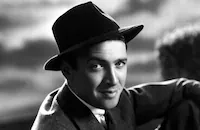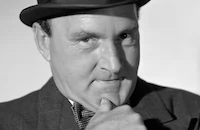No Highway in the Sky

Brief Synopsis
Cast & Crew
Henry Koster
James Stewart
Marlene Dietrich
Glynis Johns
Jack Hawkins
Janette Scott
Film Details
Technical Specs

Synopsis
On his first day of work at the Royal Airforce Establishment, metallurgist Dennis Scott meets eccentric scientist Theodore Honey, an American who has lived in England for many years. Scott is intrigued by Honey's assertion that the establishment's newest airplane design, the Reindeer, is flawed because after 1,440 hours of flight time, the plane's vibrations will cause the tail to fall off. After work, Scott offers Honey a ride home and meets his twelve-year-old daughter Elspeth, whose English mother died during a World War II bombing raid. Scott is aghast to discover that Honey, who views mathematics as a pure, abstract science, did not include his computations in his preliminary report, and that his daily testing of a Reindeer tail will not be completed before the Reindeer planes in service have exceeded the 1,440 hour mark. Scott reprimands Honey, pointing out that the formula might be important to the people aboard a Reindeer plane, but Honey responds that as a scientist, he cannot be concerned about people. Later, Scott investigates the crash of a prototype Reindeer and learns that the tail section was not found at the crash site in Labrador. Scott sends Honey to Labrador to locate the missing wreckage, and while boarding the plane, Honey does not notice that it is a Reindeer. On board, the nervous Honey is calmed by stewardess Marjorie Corder, who is amused to learn that the first-time flyer is an aviation scientist. Also aboard is glamorous film star Monica Teasdale, and when Honey discovers that the plane is a Reindeer and that it has been flying for 1,422 hours, he advises Monica and Marjorie that the men's bathroom is the safest place in the event of a crash. The pilot is baffled by Honey's frantic claims that the plane's tail will fall off, although Honey's sincerity convinces Monica and Marjorie. The plane lands safely at Gander, however, and while it is being re-fueled, the captain orders a thorough inspection. Convinced that Honey is crazy, the captain orders him detained, but Honey, who has realized that people are more important than mathematics, sabotoges the plane so that it cannot take off. Honey's instinctive reaction to the unseen danger convinces Monica that he was right, and after she and Marjorie return to London, both look after Elspeth. While Honey is delayed by the authorities in Gander, Monica visits the RAE's director, Sir John, and Scott to tell them that Honey is not crazy. Sir John and Scott are uncertain what to do, for if Honey's theory is correct, the RAE will be liable for authorizing an unsafe design, and the airline utilizing the Reindeers will lose a fortune. Scott accelerates Honey's laboratory test, much to the chagrin of Honey, who has returned to London. Scott convinces Honey of the necessity of the twenty-four-hour testing, however, and while Honey works at the laboratory, Marjorie continues to care for Elspeth. Both Monica and Marjorie have grown fond of Honey, but Monica, realizing that she could never fit into his world, leaves for America. While the test continues, Sir John prepares for an upcoming committee meeting, and Honey is interviewed by psychiatrists to determine if his actions in Gander were caused by mental illness. After 1,522 hours, the tail in Honey's laboratory has not failed, and he begins to wonder if his critics are right. Marjorie urges Honey to defend himself at the committee's review, but Honey, determined to hide in his laboratory and have no further interactions with people, asserts that he will say nothing. Marjorie reminds him that he cannot return to his past isolation, and that if he does not determine the truth about the Reindeers, flight attendants like her will be the ones to suffer. At the inquiry, the committee decides that they cannot ground Reindeers based on Honey's unsubstantiated theories, and Honey finally speaks out, asserting that he will sabotage Reindeer planes until his theories come to the public's attention and they refuse to fly on them. Honey then quits his job and returns home, where Marjorie praises him for defending his beliefs. Upon discovering that Honey is so disorganized that he has not cashed his paychecks, Marjorie declares that she will marry him and care for him and Elspeth. Happy, Honey returns to his office, and is packing his belongings when Scott and Sir John burst in to tell him that the Labrador crash site has been investigated, and the Reindeer's tail section was responsible for the wreck. Marjorie also arrives, and while they talk, the test Reindeer collapses. As Scott and Marjorie rejoice in Honey's vindication, the bemused scientist realizes that he forgot to incorporate temperature variations into his calculations.

Director

Henry Koster
Cast

James Stewart

Marlene Dietrich

Glynis Johns

Jack Hawkins

Janette Scott

Elizabeth Allen
Ronald Squire
Jill Clifford
Niall Macginnis

Kenneth More

Wilfred Hyde White

Maurice Denham
David Hutcheson
Hugh Wakefield
Hector Mcgregor
Basil Appleby
Michael Kingsley
Peter Murray

Dora Bryan

Felix Aylmer
Karel Stepanek
Wilfrid Walter
John Salew
Marcel Poncin
Cyril Smith
Tom Gill
Hugh Gross
Arthur Lucas
Dodd Mehan
Maxwell Foster
Gerald Kent
John Lennox
Douglas Bradley Smith
Stuart Nichol
Philip Vickers
Philip Ray
Roy Russell
Donald Bisset
Stephen Darlot
Kenneth Cleveland
Donald Scott

Arthur Hill
Philip Ashley
Diana Bennett
Robert Dickens
Catherine Leach
Gerturde Kaye
Ben Williams
Stuart Lindsell
Alec Finter
Lawrence Baskcomb
William Murray
John Horsley
George Neil
Michael Mccarthy

Bessie Love
Crew

Film Details
Technical Specs

Articles
No Highway in the Sky
Although No Highway in the Sky stars James Stewart and Marlene Dietrich, the film is in fact one of Fox's British productions. Apart from the musical score, the entire film was produced in England. This was not only because of the British setting and supporting cast, but was also necessary in order to use funds which were frozen in England. Shooting took place at Denham Studios, with location shooting at the Blackbushe Airport. One of the key British crew members was the cinematographer Georges Périnal; the director Henry Koster recalls: "He was a wonderful cameraman, always grouchy. When I said to him, 'Good morning, Georges,' he would answer, 'Uggh.'"
According to Koster, it was Darryl F. Zanuck who suggested that he read the novel. Initially Koster hadn't thought of Stewart for the role, despite having just directed him in a similar role for Harvey (1950); casting Stewart was Zanuck's suggestion as well. In the middle of shooting, Stewart fell ill with appendicitis and had to be hospitalized for a week. Koster recalled of Dietrich: "...my idea was to make an atmosphere of pleasant friendship and relaxation and humor. I couldn't get it with her, because there was a tension coming from her." He further speculated that she may have felt a rivalry with the younger actress Glynis Johns, who plays Stewart's romantic interest. Off the set, Koster found Dietrich "one of the most charming women I ever met," and a "great cook."
In Britain, the film was released under No Highway, the novel's original title; No Highway in the Sky was used for the American release. Variety proclaimed it "one of the best films to come from a British studio for some time." The reviewer further praised Koster's "expert touch" and his "sharp sense of suspense, comedy and drama." The New York Times critic Bosley Crowther appreciated Koster's "sly construction of an unusual plot and wry suspense, and Edwin Schallert of the Los Angeles Times said that Stewart "has one of his better, if not his best roles." For Koster, his proudest moment was when Charlie Chaplin personally phoned him to express how much he enjoyed the film. In 1952, Lux Radio Theatre broadcast a radio dramatization of the film, with James Stewart and Marlene Dietrich revisiting their roles.
Producer: Louis D. Lighton
Director: Henry Koster
Script: R. C. Sherriff, Oscar Millard and Alec Coppel, based on the novel No Highway by Nevil Shute
Director of Photography: Georges Perinal
Art Director: C. P. Norman
Film Editor: Manuel del Campo
Cast: James Stewart (Theodore Honey), Marlene Dietrich (Monica Teasdale), Glynis Johns (Marjorie Corder), Jack Hawkins (Dennis Scott), Janette Scott (Elspeth Honey), Elizabeth Allan (Shirley Scott), Ronald Squire (Sir John), Jill Clifford (Peggy Miller). BW-99m.
by James Steffen
Sources:
"No Highway." Variety, July 4, 1951.
Crowther, Bosley. "The Screen in Review." New York Times, September 22, 1951, p.8.
Eliot, Marc. Jimmy Stewart: a Biography. New York: Harmony Books, 2006.
Henry Koster. Interviewed by Irene Kahn Atkins. Metuchen, N.J. and London: Directors Guild of America and Scarecrow Press, 1987.
Shute, Nevil. No Highway. New York: William Morrow, 1948.
Schallert, Edwin. "Highway Engrossing; Queen for a Day Shows." Los Angeles Times, September 15, 1951, p.A7.

No Highway in the Sky
Quotes
I see: the scientists do the thinking for the world, and the rest of us just live in it, is that it?- Dennis Scott
Yes.- Elspeth Honey
Trivia
Notes
The working title of this film was No Highway. The picture was reviewed by Variety under the title No Highway, which was also the British release title. As noted in contemporary sources, the picture was filmed on location in Denham, at Denham Studios. An November 11, 1949 Hollywood Reporter news item reported that Newfoundland would also be a location site, but it has not been determined if any of the picture was shot there. A modern source lists Blackbushe Airport, in Hampshire, England, as an additional location. November 1950 Hollywood Reporter news items noted that James Stewart underwent an emergency appendectomy in London while the film was in production.
According to a August 22, 1951 Los Angeles Daily News article, a special advance showing of No Highway in the Sky was to be held that night in Los Angeles as a tribute to Pulitzer-Prize-winning photographer Frank Filan. Filan, who was ill at the time of the screening, was best known for his photographs of the Marine invasion of Tarawa during World War II. A modern source adds the following names to the crew credits: Production Supervisor Robert Dearing; 2nd Unit Director Herbert Mason; and Marlene Dietrich's ward Christian Dior. On April 28, 1952, Stewart and Dietrich reprised their roles for a Lux Radio Theatre broadcast of the story, which co-starred Evelynne Eaton.















